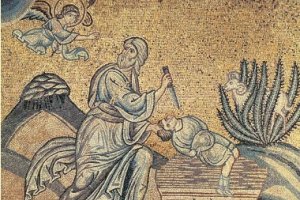

Interview with Roy Schoeman
|
Roy Schoeman is a convert from Judaism and the author of the new book Salvation is from the Jews now available through Ignatius Press. Information about the book, including excerpts, and an account of the author's conversion to the Catholic Faith can be found on his website www.salvationisfromthejews.com .
SEATTLE CATHOLIC (SC): Why is it that you decided to write this book?
ROY SCHOEMAN (RS): As a Jew coming to the Catholic Church, it was natural for me to find the relationship between Judaism and the Catholic Church among the most interesting things in the world. It was obvious to me that for a Jew to enter the Catholic Church wasn't a matter of conversion at all, but was rather simply coming into the fullness of Judaism — into the form that Judaism took after the coming of the Jewish Messiah.
Although Catholics are aware of this in principle, they often don't think of the Catholic Church as the continuation of Judaism after the Messiah. I found it an extremely interesting topic, and was surprised at how excited many Catholics became at thinking of it that way. It's everywhere you look. It's obviously in the Sacrifice of the Mass and the way the Mass is prefigured in Jewish ceremonial worship. It's in the role that the Old Testament, Jewish Scripture have in Catholic theology and the structure of the Catholic Faith. It was a very prevalent theme among the Church Fathers and in the Church in earlier days — the very deep typological significance that the Old Testament and Judaism have as a typological foreshadowing of the fullness of God's sacramental relationship with man which came into being with the coming of Christ. But it did not seem to be getting much airtime anymore. Another motivation was, frankly, the way I saw the relationship between Judaism and the Catholic Faith being high jacked by Catholics who were really following another agenda — an agenda to deny central dogmas of the Catholic Faith under the guise of ecumenical relations and better relations with the Jews. As a Jew who became Catholic, I became personally indignant at the fact that the beauty and the richness of the relationship between Judaism and Catholicism was being intentionally distorted for such an agenda, an agenda which was very much at the disservice of the Glory of God.
SC: What has been the initial reaction to the book?
RS: I intentionally wrote the book for three distinct audiences — primarily for Catholics and Jews, but also for Messianic Jews — Jews to whom Jesus revealed his Messiahship but then became Protestants. And the early reactions are different among the different audiences. I've had very positive reactions from early Catholic readers, some saying that they've understood for the first time, in reading my book, where the excitement and meaning and purpose of the Old Testament lay, essentially why they should be interested in the stories of Jews in the Old Testament. The Old Testament came to life for them for the first time. Some have become extremely excited about the eschatology in the book, in beginning to think seriously about the interaction between Jews and the Catholic Church and what that might signify for where we are in the history of salvation with respect to the Second Coming; and by the serious theological consideration of how the Holocaust might fit into the greater picture of God's plan for the salvation of mankind. I was particularly gratified by the reaction of some Jewish readers, since I view the heart of my vocation as helping to open a door for Jews to enter the Catholic Church. For instance, one Jewish man read the book and although he was open-minded towards the Catholic Church before reading it, the book tied everything together for him, and as a result he will be entering the Church the week before Christmas. Other Jews who have read the book, although they have not yet had the grace to accept the truth of the Messiahship of Jesus, nonetheless see for the first time how the issue of a Jew entering the Catholic Church is not an issue of being disloyal to one's heritage or to one's faith, but how it is rather an expression of the fullness of Judaism, if one believes that Jesus was the Messiah. Since the book has only been out a few weeks. I haven't had much opportunity to see many reactions, but those are the ones that come to mind.
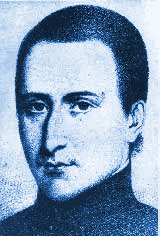 Alphonse Ratisbonne, Jewish Convert and Catholic Priest |
SC: What were the events that led to your entering the Catholic Church?
RS: I received some extraordinary graces. I had two mystical or apparition-type experiences. The first one, which I received during a period when I was essentially agnostic, made it clear to me that there is a God; that everything that one does during this life matters for moral content, for good or ill; that one lives forever and the nature of that eternal life is very dependent on how one spends one's life on earth; that everything that happens is a result of Divine Providence; and, most importantly, that every moment of one's existence, one is held in a infinite depth of love, far greater than one can imagine.
During this experience, I was not aware that the God who was revealing Himself to me was Christ. However, after this experience, every night before I went to sleep, I would say a short prayer to know the name of the God who had revealed Himself to me. A year later, I went to sleep and I had an extremely vivid and awake-feeling dream of the Blessed Virgin Mary, and when I woke up, I knew that the God who had revealed Himself to me was in fact Christ, and I knew that I wanted to be as good and as complete a Christian as I possibly could.
At that time, I still didn't know anything about the Catholic Church and what the difference was between a Catholic and a Protestant — I knew nothing more, frankly, about Christianity then what had been imposed on me by the mass culture; for instance what I had learned from Christmas carols. So it took about two years for me to find my way into the Catholic Church — for me to figure out enough of what was going on and arrange to be baptized.
By the way, at the insistence of the publisher my conversion story is included as a postscript in the book.
SC: What was the reaction you received from your mentors — the rabbis under whom you studied — and your family?
RS: At the time of my conversion, I was in my early thirties, and so long out of touch with the Rabbis whom I had grown up studying under. I have since indirectly found out the reaction of one of those Rabbis, which was extremely hostile and negative — upon encountering my parents by chance in a local restaurant, he began a shouted, purple-faced tirade against them for what I, their adult son, had done. I see the incident as Divine Providence, for it had the unintended effect of making my parents far more sympathetic to my conversion. They could not help but see the irrationality of his fury.
My parents' reaction was, in the long run, much more favorable than I would have hoped. It's always difficult for a Jewish family. There's a very strong drive among the Jews to perpetuate the Jewish identity and maintain the integrity of the Jewish people. That is, in fact, one of the topics dealt with in the book — why God might have put that particular characteristic in the Jewish people, and how it may have played a absolutely critical role in enabling the Jewish people to bring the gift of the Messiah to all of mankind. We know as Christians that the need for Jews to maintain that exclusivity, that separate identity, has passed with the coming of the Messiah, and often find it offensive. Yet not surprisingly, Jews who do not recognize who Jesus was do not realize that, and that characteristic still seems to be a very integral part of the Jewish people. So my parents had that to deal with, but over time they began to see that what I had done was not in itself a rejection of the Jewish people or a rejection of my Judaism, but it really was an issue of who Jesus was and a continuation of my Judaism if Jesus was in fact the Messiah.
SC: Who were some of your role models who you looked towards in your conversion process before your baptism, but also since then in your subsequent efforts?
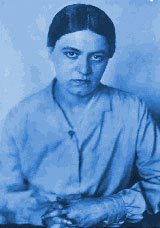 Edith Stein, Jewish Philosopher  St. Edith Stein, Catholic Nun |
RS: My conversion process to a large extent took place in a vacuum, and I think that was Divine Providence and grace. Probably for the first year and a half of my going to Catholic Masses, I was never at a parish Mass, I only found myself at Masses at pilgrimage sites, monasteries and convents. I was very insulated from the contemporary Catholic environment, which I think was grace because, frankly, the purity of the spirituality, the ascetic values were probably much higher where I found myself than they would have been had I gone to the average parish Mass. Similarly, I didn't actually have much contact with Catholics other than contemplative monks, who were the first Catholics I got in touch with to explore the Catholic Church. This goes back to the fact that my introduction to Christianity was through a sort of mystical experience, so I thought that contemplative monks would be the most likely to understand my experience. I was not wrong about that.
The first guide who introduced me to Catholicism was a Carthusian monk. It was really he who introduced me to the Catholic realm. Once I began the process of entering the Catholic Church, I, though Providence, got in touch with a very wonderful priest who was at the time the novice master and the vocations director for the Oblates of the Virgin Mary in Boston. He picked up where the Carthusian monk had left off, completing my catechesis in the Doctrines and Dogmas of the Catholic Church.
SC: And what about Saints or Catholics from years past?
RS: This brings up a very curious story. After that initial experience I described which taught me of the existence of God, but before I had any suspicion that He had anything to do with Christianity, I was walking through Harvard Square and I passed a bookstore display window. A book jumped out at me, so to speak, from the window display, and I went in a bought it without having any idea who the author was or what the book was or anything. It was St. Teresa of Avila's Interior Castle. I read that very enthusiastically and it resonated very deeply with me. That was my first Christian reading and it marked me very deeply. Years later I found out that Teresa of Avila had at least one Jewish grandfather. Whether the rest of her family was Jewish or not is a little bit harder to ascertain from the documentary evidence. But, in any case, she clearly had a very special relationship to the Jewish people, and I attribute to some extent my conversion to her intercession.
SC: You touched on this a bit in your first response, but how do you as one who has come into the Church from Judaism react when you hear Church leaders make such claims as the Old Covenant is still in effect (or even salvific for the Jews), or when you read Catholic documents which implicitly or explicitly challenge or repudiate the Church's mission to the Jewish people?
RS: That question involves two very related but distinguishable issues — there's the pastoral aspect, and there's the doctrinal aspect. I respect the fact that for pastoral reasons, Church leaders might present things in as favorably-colored a light as possible without actually contradicting doctrine, and therefore when speaking to Jewish audiences or when speaking with a particular pastoral purpose oriented to the Jewish community, they might say things which lend themselves to being understood in a way perhaps a little more favorable to Judaism then they're strictly saying within the statement itself — and that ambiguity may, in fact, at times be intentional. I respect the fact that there might be pastoral prudence behind doing that.
That's very different, however, than contradicting Doctrine or compromising Doctrine. When I see that (and I certainly have seen that), that is an affront. It is a terrible thing when someone who presents himself as speaking for the Catholic Church and presenting the Catholic Faith, says something which contradicts Dogma. Often, when I've seen that done, the person doing it is actually using the Jewish-Catholic dialogue to push an agenda which he or she was intending to push in any case, which tends to be a modernist, syncretist kind of revision of Catholicism.
Sometimes, it's done for another reason, a little less malevolent in its inspiration. The world of Jewish-Catholic dialogue has become somewhat of a closed world. The participants spend all their time talking to each other and reading each other's papers and so forth. I think that over time they may have gotten out of touch with the rest of the world and real Catholic theology. A kind of mutual admiration society has developed, and they have slowly drifted further and further a field without quite noticing how far a field they've gotten. I think you see that sometimes in their reactions when they get called to task; they're kind of shocked and indignant because they haven't noticed how far they've strayed from Catholic doctrine.
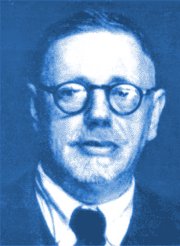 Former Chief Rabbi of Rome and Catholic Convert Israel Zolli |
SC: As was the case with release of Dominus Iesus when participants on both sides of Catholic-Jewish dialogue were shocked and indignant at this basic restatement of the Catholic Faith.
RS: That's a good illustration of how they might have gotten out of touch with real Catholic Doctrine in their own self-enclosed world.
SC: But you do recognize the value in interreligious dialogue to a certain extent if that dialogue does not go too far?
RS: Well I'm not quite sure what "dialogue" means. I certainly think that there's a tremendous value to interreligious conversation and exchanges. However, I am not completely convinced that it's ever right for a Christian to engage in dialogue with a non-Christian with the explicit understanding and commitment that there is no intention to bring about conversion. I'm not sure if that's reconcilable with the great commission.
SC: So Christians should not engage is such dialogue if they are not seeking conversion?
RS: I would not go quite so far. It may be perfectly legitimate to be there for other primary reasons than to seek conversion, but if you enter the dialogue saying I promise you that I have no interest in seeking your conversion, that's the point at which perhaps a line has been crossed.
SC: Do you see that as an aspect of some of these dialogue sessions?
RS: I see it as a danger. My experience as an outside and an occasional observer of these dialogue sessions is that the Jewish side can afford to be more honest that the Catholic side. There was a kind of seminal essay written by Rabbi Joseph Soloveitchik, an orthodox Jewish rabbi, about forty years ago called Confrontation, which is still discussed in the dialogue, in which he said he had no interest on dialoging with Christians on any theological issue because, let's face it, you have to think we're completely wrong and we have to think you're completely wrong. We're happy to work with you on projects of joint interest where we have common cause, but there are no real grounds for theological dialogue, and we find it patronizing that you think that you know the truth of our religion and we don't. Being on the Jewish side, he could afford to be bluntly honest. I have seen that kind of frankness expressed from the Jewish side but not from the Catholic side. I understand the logic of their assertion that from their point of view, there's really no basis for dialogue on a theological level.
SC: What is your personal involvement in such dialogue? Are you a frequent invitee to participate and observe Jewish-Catholic dialogue?
RS: I participated as an observer at a conference at Boston College that was part of the Jewish-Catholic dialogue, and when a friend of mine who was a priest heard I was going, he said essentially don't expect to be welcome; you're going to be the skunk at the garden party. And I found that to be somewhat the case, that my presence sort of gave the lie to one of the premises under which the dialogue takes place — that there is no danger to Jews exposing themselves to the Catholic Church or to Catholic theologians or to Catholic thought, because the Church no longer seeks their conversion, or even that there's no legitimacy to Jewish conversion to Christianity.
My simply being there as a fervent Jewish "convert" gave the lie to such claims. And it also frankly gives the lie to some of the underlying theology, some of which you've mentioned: that the Church has no mission to the Jews; that the Church does not support the idea of Jews entering the Catholic Church and there's no reason for Jews to become Christians; that all God wants of them is to be a good Jew; and so forth.
SC: You mentioned earlier that in your journey to the Church, you were drawn to the spirituality found in various monastic communities. Coming from Judaism into the Church, how do you view the liturgical reforms which followed Vatican II and have resulted in the Novus Ordo Mass?
RS: The word "Catholic" in Catholic Church means "universal". And the Catholic Church is unique in being the means of salvation and the relationship between God and man for every human being on earth. I respect that and I respect the fact that what suits my sensibilities and my spirituality may or may not be the most appropriate thing for everyone else.
However, as a Jew, I am very used to a sense of the sacred; a sense of being set apart for the service of God; for a sacred function. There's a tremendous sense in Judaism of the sacramentality of objects and of places. For instance, the Torah scroll, which is perhaps the most sacred physical object that we have in Judaism, is treated with a reverence which is more reminiscent of Catholic practice before Vatican II. For instance, when a Torah scroll can no longer be used because it's falling apart, it can't be simply thrown away; it must be buried as though it were a person. This obviously echoes how the sacred vessels used in the Mass, and even the water used for their purification, must go cleanly into the ground and not be disposed of as ordinary water.
Similarly, there's a sense of the sacred and almost taboo surrounding the altar space in the synagogue. It's a great honor to be invited or allowed to be present on the altar in a Jewish synagogue. There's a great sense of ritual purity around the touching of the Torah scroll. The person who reads the Torah scroll doesn't touch it with his finger, but uses an instrument — a silver pointer to follow his place. The Torah scroll traditionally can't be touched by women, because of issues of possible ritual impurity and so forth. So, the whole sense of the sacred that is intrinsic in classical Judaism, is a sense of the sacred which is much more present in the pre-Vatican II Catholic practices.
For that matter, the use of a sacred language is closely paralleled. Hebrew was not a spoken language for almost two thousand years. It was reserved for speaking to God, and for sacred writings, much as Latin was in the Mass until the revisions. So, my sensibilities are very much more in line with pre-Vatican II sensibilities, but I'm leaving aside the issues of how my preference and what resonates with me, may or may not be of universal value.
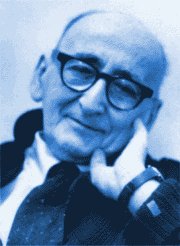 Charlie Rich, Hasidic Jew and Catholic Convert |
SC: You wrote an article recently surrounding the pre-release reaction to Mel Gibson's film The Passion. What is your take on that controversy?
RS: I think that there is still a very serious problem with genuine anti-Semitism today, but that problem is only exacerbated when some people "spin" the situation and make unjustified accusations of anti-Semitism for their own purposes.
A lot of the reaction to Mel Gibson's movie is based on something very different from anti-Semitism, although that is what it is being disguised as. That muddies the water; it does a disservice to God, and it makes it all the harder to address real anti-Semitism where it does exist. Let me explain a little bit.
First of all, it's completely legitimate that the culture, and country, in which we live is predominantly Christian, and at times reflects that fact. I suspect that Christians who live in Israel do not react very strongly and very negatively to the fact that there are laws that, to some extent, protect the fact that Saturday is the Sabbath, that there are public observances of Jewish holidays, and so forth. I don't see any reason why Christian observances should not be considered equally legitimate in our society. Now, some of the recent opposition to the reflection of Christianity in our social institutions has come from atheists and people opposed to God, but some has also come from Jews trying to insulate themselves against exposure to Christianity.
That's brings me to the theme which I think you saw in that piece. (Ed. note: the piece may be viewed in its entirely at www.salvationisfromthejews.com/passion.html ) There are several motives behind Jews at times trying to insulate themselves and their families from exposure to Christianity, and one of the motives is frankly that Jesus is real. As it says in the Scriptures, "He stands at the door and knocks." Everything in one's consciousness that evokes an image of Jesus, that reflects any Christian imagery, has the potential for being a vehicle for the Lord to actually get through to the human soul. I think I can see how that operated in myself prior to my conversion — how there was a very particular resonance to things Christian that was in some sense "dangerous" because it was Jesus knocking at the door, trying to get in. I think that's at least subconsciously part of the motivation in the Jewish community against being forced to be exposed to Christian imagery, and part of the motivation behind their indignation at the idea that The Passion should be widely distributed or widely viewed. There might be a legitimate concern about the film inspiring anti-Semitism as a result of mis-formed Christians identifying with Jesus in a way which results in hostility towards Jews, but that danger is going to be there in any depiction of the Passion which is faithful to the Gospels, because of the way the crucifixion actually unfolded. But I think there's also a subconscious concern that if people actually see a good depiction of Jesus and of who He was, of His love, of His suffering, of His Patience and so forth, it may open a door in the human soul and actually bring about conversion. I think that might be, whether consciously or not, part of the objection also.
SC: So you see it more as a spiritual defense mechanism against that possibility than an actual physical defense against a specter of anti-Semitic violence?
RS: I think that they're both at play, and that the participants are probably not aware of the spiritual one. They themselves probably honestly think it's all a response the specter of actual anti-Semitism, but I think that beneath the surface, it might be more a matter of the spiritual defense mechanism at work, yes.
SC: Part of your book is dedicated to detailing the occultist and anti-Christian nature of Adolph Hitler and the German Nazi party. Why is it, do you think, that the myth that Nazism was an extension or the logical result of Christendom and Catholic teaching is still a popular misconception today?
RS: I think it's interesting, and probably not coincidental, that among the more recent perpetrators of that myth, many have been fallen-away Catholics; many have been modernist Catholics: James Carroll comes to mind…
SC: Gary Wills?
RS: Exactly. Whereas the Jews — at least those closer to the Holocaust itself — were under no such misconception. There are many laudatory quotes by Jews in the late 40's and the 50's about the extremely positive role the Catholic Church played in defending the Jews during the Holocaust. Albert Einstein, for instance, stated that "only the [Catholic] Church stood squarely across the path of Hitler's campaign" and that as a direct result "what I once despised I now praise unreservedly." Pinchas Lapide, a former Israeli diplomat, in his book Three Popes and the Jews credits Pope Pius XII with saving the lives of about 860,000 Jews during the war, exceeding "by far those saved by all other churches and rescue organizations combined." Similar quotes can be found from other Jewish leaders. The current spate of calumnies against the Church, and Pius XII, are clearly revisionist history, frequently coming from fallen-away "Catholics" out to negate, I'm tempted to say destroy, the Catholic Church. So I think that anti-Semitism serves as an extremely useful cover for enemies of the Church to attack Catholic Faith and morals and practices and Doctrine; and to sully the reputation of the Church.
SC: Pope John Paul II and a number of bishops have apologized to the Jewish people for certain unspecified actions of past Catholics. These apologies have drawn criticism from both Catholics and Jews for being too vague and failing to give an accurate indication of in what circumstance and to what extent Catholics were blameworthy. What is your take on the effects such apologies have had?
RS: Well first of all, I think one would have to be a moral theologian to figure out what it means to apologize for the actions of another person. I am, in general, a bit puzzled by it. Obviously one can't repent for the sins of another.
Leaving that aside, I would put such apologies in the pastoral category. That is, if there isn't anything theologically offensive or historically inaccurate in it, expressing a general sense of regret that something bad happened in the past, and putting on the mantle of spokesperson for some group which encompasses the actors, may not be doing any harm and may serve a valuable pastoral purpose.
SC: Something that has been specifically apologized for by a number of Catholic writers in recent decades, have been the actions of Blessed Pope Pius IX with regards to Fr. Mortara. Do you think the critics in this case have an accurate understanding of the situation?
RS: I personally don't think the critics are justified. Giving them the benefit of the doubt, they are at the very least judging Pius IX on the basis of a contemporary view of the state grossly different from the accepted role of the state in Pius IX's day.
I'll give an example. Even today we believe it's legitimate for the state to take, to some extent, a position of guardianship over the welfare of its citizens. That's why, for instance, in Massachusetts, you're not allowed to drive without wearing a seatbelt. The state is taking a role of guardian, protecting people for their own good whether they want that protection or not. Making certain drugs illegal, forbidding minors from smoking and so forth are other examples of the state taking a guardianship role. We don't question the right of the state to have such laws.
If the state really believes that people have eternal souls and their eternal destiny is dependant, in part, on their religious practices and their baptism (which clearly was the belief at the time of Pius IX); if the state is entitled to look after the welfare of its citizens and if that welfare is dependent on their religious practices, then it is completely legitimate for the state to take a role in protecting that welfare. The Mortara's lived in the Papal states, which had a law insisting on the right of every Christian child to receive an Catholic education. The Papal states were in fact quite moderate in taking a "hands off" attitude towards Jews, and not interfering with the religious life of Jews. The problem was that as a child Fr. Mortara was baptized, albeit without the consent of his parents, so he fell under the law requiring him to receive a Christian upbringing. As the head of the government of the Papal states, it was the duty of Pius IX to see that the child was given that right; as the shepherd of souls under his jurisdiction, I am sure that he also felt a moral duty to see to it.
My understanding is that papal representatives explained the situation to the parents and suggested that they move from the papal state, to avoid the situation. But they declined to do so, at which point the Pope was simply enforcing a law which, certainly by the standards of the day, was not at all an unreasonable law. One should also acknowledge the tender paternal love and care which the Holy Father showed to his ward, a love and care which Father Mortara never ceased to be grateful for.
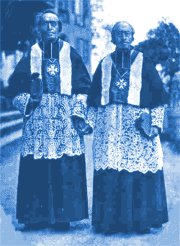 The Lemann Brothers, Jewish Converts and Catholic Priests |
|
The following Postulatum was circulated by the Lemann Brothers at the First Vatican Council and signed by virtually all of the attending bishops:
"The undersigned Fathers of the Council humbly yet urgently beseechingly pray that the Holy Ecumenical Council of the Vatican deign to come to the aid of the unfortunate nation of Israel with an entirely paternal invitation; that is, that is express the wish that, finally exhausted by a wait no less futile than long, the Israelites hasten to recognize the Messiah, our Savior Jesus Christ, truly promised to Abraham and announced by Moses; thus completing and crowning, not changing, the Mosaic religion. "On one hand, the undersigned Fathers have the very firm confidence that the holy Council will have compassion on the Israelites, because they are always very dear to God on account of their fathers, and because it is from them that the Christ was born according to the flesh. "On the other hand, the same Fathers share the sweet and intimate hope that this ardent desire of tenderness and honor will be, with the aid of the Holy Spirit, well received by many of the sons of Abraham, because of the obstacles which have held them back until now appear to be disappearing more and more, the ancient wall of separation now having fallen. "Would that they then speedily acclaim the Christ, saying "Hosanna to the Son of David! Blessed be He who comes in the name of the Lord!" "Would that they now hurl themselves into the arms of the Immaculate Virgin Mary, even now their sister according to the flesh, who wishes likewise to be their mother according to grace as she is ours!" |
SC: Pope Pius IX was well acquainted with the Lemann brothers; was we not?
RS: I think of the Lemann Brothers as the patron saints of my book. Reading their works was one of the original inspirations for writing my book, because they took on very much the same role I am attempting, that of illustrating the integral relationship between Judaism and the Catholic Faith and illuminating one with the other.
The Lemann Brothers were twin brothers, born to a wealthy family of merchants living in Lyon, France and orphaned at an early age. They were raised by relatives, and at the age of eighteen, they were baptized together into the Catholic Church, having come to the Faith through seeing the charity and love in Christians, then reading the Scriptures and coming to the conclusion that Jesus Christ was exactly who the Christians said he was: the Jewish Messiah.
They were persecuted terribly by their family. They actually had to flee Lyon to escape the wrath of the family. Eventually, they became priests and canons of the Church. They each had very active apostolates. Between them, they wrote over 150 books, started orphanages, a home for the deaf, schools, and even religious communities.
They were very friendly with Pius IX and participants at the First Vatican Council. At the Council, with the Holy Father's approval, they circulated a Postulatum, which is essentially a petition that either gets approved or rejected by the bishops of the Council, formally inviting the Jews to join the Church. This Postulatum was signed by virtually all of the bishops at the First Vatican Council, and it was approved by the Pope. It was not formally pronounced by the Church because a war intervened and prematurely terminated the First Vatican Council. The only reason that it didn't have even more Bishops' signatures is that the Lemann Brothers, out of deference to Pius IX, stopped collecting signatures when the Postulatum had as many as the Decree for Papal Infallibility, because they didn't want it to be more overwhelmingly approved than Papal Infallibility.
SC: How do you view the Spanish Inquisition?
RS: Again, the facts of Spanish Inquisition are misunderstood and, at times, intentionally misrepresented to calumnize the Catholic Church. For instance, it often comes as a surprise to Jews when it is pointed out, absolutely correctly, that the Inquisition never asserted any authority over Jews at all, but only over Christians, and never — not once — persecuted a Jew as a Jew. Unfortunately, at the time of the Inquisition many Jews in Spain were pretending to be Catholic, in part as the result of a government decree expelling all Jews from Spain in 1492. It was the role of the Inquisition to protect the Church from heresy and heretics — a role which we still see some need for today ! — and thus Jews who were only pretending to be Catholic, while maintaining their Jewish faith and practices in secret, were legitimate targets for investigation.
SC: Your book contained a significant amount of information tying Old Testament prophecies to their fulfillment in the Gospels. How did you view such passages before you came into the Church, and what was like to re-read such prophecies through the eyes of the Faith?
RS: Jews, even quite religious Jews, growing up are far better educated in the Torah — the first five books of the Old Testament — and the Talmud than in the rest of the Old Testament. I don't think this is entirely coincidental. I think the Prophets are avoided for two reasons — one, they frequently have quite harsh words to say about the Jewish people, their infidelities, God's wrath towards them, and so forth, which rubs against the grain of how Jews (and probably all people) like to view themselves. But it may also well be the case that the Prophets are also avoided precisely because it is there that most of the passages are found which can make one stop to think about Jesus, and whether He might have been the prophesied Messiah…So I had little familiarity with those key passages before my conversion. Of course, it is also true that Jewish "apologists" have alternative explanations for all of those passages which redirect them away from Jesus, at times dependent on giving them a fairly implausible "spin", at other times dependent on an alternative translation or even a different underlying Hebrew text. I go into some detail about several such key passages, and the way Jewish anti-missionaries deal with them, in my book.
Needless to say, it was heartbreakingly beautiful to read such passages, sometimes for the first time, as a Christian, and to see the love and devotion which the Jews had for Jesus anticipating His arrival, and which He had for them.
SC: The term "anti-missionary" is used in several places in your book. What does this phrase refer to?
RS: Missionaries are, of course, Christians who try to convert Jews to Christianity; "anti-missionaries" are Jewish apologists who try to counter the missionaries' arguments and "protect" Jews from conversion.
SC: What is the "miracle of the scarlet thread" and how is it interpreted by both Catholic and Jewish scholars?
RS: Most Christians are aware of the many ways in which the Old Testament supports Christianity's claims that Jesus was the Jewish Messiah, but few are familiar with the passages in the Talmud — a strictly Jewish "scripture" based on oral tradition and written down several centuries after the death of Jesus — which do the same thing. I discuss about a half dozen of these passages in my book. Probably my favorite is the "Miracle of the Scarlet Thread". Shortly put, the Talmud recounts that when the Temple stood in Jerusalem, the sins of the Jewish people were taken away each year on one day, Yom Kippur, the holiest day of the year, when the High Priest would enter the Holy of Holies with a sacrifice to atone for the sins of the people for the preceding year. Each year, a scarlet thread was affixed to the entry to the Holy of Holies, and miraculously, when the sacrifice within was accepted, the thread would turn white as a sign that the sins had been forgiven. Well, the Talmud recounts that, for no clearly identifiable reason, the miracle ceased to take place about 40 years before the destruction of the Temple. In other words, after about 30 A.D. the thread never again was turned white! We know, as Christians, that that was precisely when the Temple sacrifices lost their efficacy — at the moment of the Crucifixion, about 30 A.D., when as a sign of the fact the curtain in the Temple was rent in two (Matthew 27:51). Thus to Christian eyes it is evident that the Talmud itself attests to the truth of Christianity. Jewish scholars have an alternative, not very convincing, explanation of why the miracle ceased to occur — that God had stopped forgiving the Jews their sins because too many of them had committed the unforgivable sin of following Jesus !
SC: You draw a number of parallels between contemporary events and certain end-times prophecies. How do you view the times in which we live from a spiritual perspective?
RS: I think we live in very serious times. I would not put myself in the position of saying where we fall on the timeline for the Second Coming, but that there are clearly resonances between some of the events and conditions of our day, and those associated with the Second Coming. Whether those resonances are foreshadowings or more than that, I can't say.
SC: Do you see some significance to the wave of popular sincere Jewish conversions over the past century and a half?
RS: What I try to do in my book is simply lay out circumstances, lay out facts, lay out the relevant biblical prophecies, and leave it to the reader to decide how congruent they all might be. Thus I try to leave the final judgment of the significance of those circumstances to the reader. I would do the same with the current wave of Jewish conversion. But I do think it is significant that sincere Jewish conversion is probably more widespread now than ever before, and that there is widespread Jewish conversion in Israel itself. Just how significant, I think that only time or prayer can tell.
SC: What steps do you think need to be taken to revitalize the Church's missionary effort toward the Jews?
RS: I think it's all there is Doctrine. It's all there in Dogma. The steps that need to be taken are the same steps that need to be taken all across the board, which is fidelity to true Church teaching.
SC: What is the key message you hope Catholics retain from the book?
RS: I hope that it leaves them with a deeper love and appreciation of the Catholic Faith; a richer understanding of the meaning of Judaism; and a zeal to work and pray for the conversion of the Jews.


